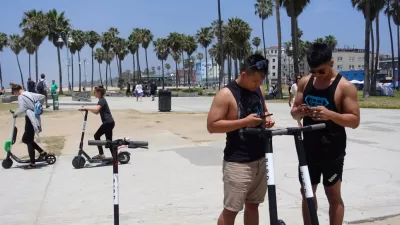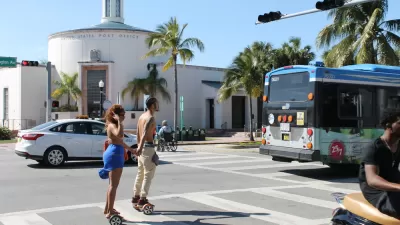The narrative of electric scooter users as affluent, entitled, and "tech bro-y" does not reflect the demographics of fans of the new mobility technology, according to a new study. Electric scooters are actually very popular.

A new study finds that electric scooter users are far less affluent and "tech bro-y" than the hysteria surrounding the new mobility service might make people think, according to an article by Aarian Marshall.
Regina Clewlow, "a longtime transportation planner whose new data-crunching startup Populus wrote the report," explains the significance of the study in a soundbite quoted in the article: "You see a lot in the news about electric scooters and cities’ concerns around visual clutter….It has become a narrative, but it’s not supported by facts."
Marshall explains one of the key findings:
The study, which surveyed 7,000-person in 10 cities, found that over half the population in every place studied had a “positive opinion” of scooters in the period between May and July of this year. In some cities—Atlanta, Austin, Denver, Chicago, Washington, DC, and Los Angeles–over 70 percent of residents feel good about scooters. (In San Francisco, though, only 52 percent of respondents supported the things, which might explain all the feces.
And here's another finding that might explain the backlash against the new mobility option:
Among income brackets, those making between $25,000 to $50,000 a year are the most into the idea, and those making above $200,000 are the least. (One theory, from UC Berkeley transportation researcher Susan Shaheen: lower income urbanites who can’t afford cars appreciate the mobility of scooters, and wealthier residents who do drive find them a street-clogging nuisance.)
Electric scooter share companies, like Lime and Bird, seem aware of the potential for their service to appeal to low-income residents of urban areas, and have begun offering discounted access to scooters for qualifying riders.
Women also report a higher opinion of electric scooters than men. Marshall includes more insight, and more research, into why women might be more willing to ride electric scooters than bikes. Finally the story concludes a discussion about what it might take to build infrastructure that serves the need of all users, including an emergent constituency of people who love electric scooters.
FULL STORY: Not Just Tech Bros: E-Scooter Fans Are Surprisingly Diverse

Maui's Vacation Rental Debate Turns Ugly
Verbal attacks, misinformation campaigns and fistfights plague a high-stakes debate to convert thousands of vacation rentals into long-term housing.

Planetizen Federal Action Tracker
A weekly monitor of how Trump’s orders and actions are impacting planners and planning in America.

San Francisco Suspends Traffic Calming Amidst Record Deaths
Citing “a challenging fiscal landscape,” the city will cease the program on the heels of 42 traffic deaths, including 24 pedestrians.

Defunct Pittsburgh Power Plant to Become Residential Tower
A decommissioned steam heat plant will be redeveloped into almost 100 affordable housing units.

Trump Prompts Restructuring of Transportation Research Board in “Unprecedented Overreach”
The TRB has eliminated more than half of its committees including those focused on climate, equity, and cities.

Amtrak Rolls Out New Orleans to Alabama “Mardi Gras” Train
The new service will operate morning and evening departures between Mobile and New Orleans.
Urban Design for Planners 1: Software Tools
This six-course series explores essential urban design concepts using open source software and equips planners with the tools they need to participate fully in the urban design process.
Planning for Universal Design
Learn the tools for implementing Universal Design in planning regulations.
Heyer Gruel & Associates PA
JM Goldson LLC
Custer County Colorado
City of Camden Redevelopment Agency
City of Astoria
Transportation Research & Education Center (TREC) at Portland State University
Jefferson Parish Government
Camden Redevelopment Agency
City of Claremont





























